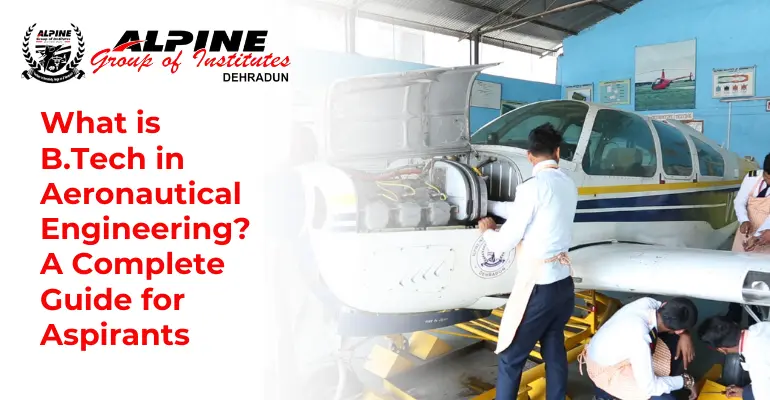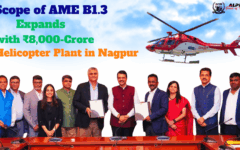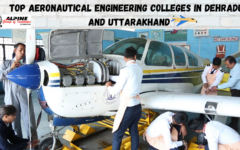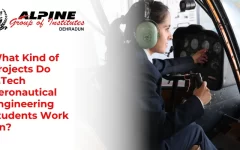What is B. Tech in Aeronautical Engineering? A Complete Guide for Aspirants
2024-12-16 10:17What is B. Tech in Aeronautical Engineering? A Complete Guide for Aspirants

What is B. Tech in Aeronautical Engineering? A Complete Guide for Aspirants
B.Tech in Aeronautical Engineering is a specialized undergraduate program that focuses on the design, development, testing, and maintenance of aircraft and spacecraft. This branch of engineering merges core principles of physics, mathematics, and mechanical engineering to solve complex problems in aviation and aerospace technology. If you’re fascinated by the mechanics of flight, space exploration, and cutting-edge technology, a B.Tech in Aeronautical Engineering could be the perfect choice for you.
Overview of the Course
A B.Tech in Aeronautical Engineering is typically a four-year program, split across eight semesters. Students are introduced to fundamental engineering concepts in the initial semesters, followed by specialized subjects in the later years. The course combines theory with hands-on practical learning, including lab work, projects, and internships in aerospace companies.
Key Subjects in the B.Tech Aeronautical Engineering Curriculum
- Mathematics & Physics: The foundation of aeronautical engineering, covering calculus, linear algebra, differential equations, fluid mechanics, and thermodynamics.
- Aerodynamics: The study of air flow over surfaces and the design of efficient aircraft structures to minimize drag and maximize lift.
- Propulsion Systems: Focus on engines and power generation mechanisms used in aircraft and spacecraft, including jet engines, turbines, and rocket propulsion.
- Aircraft Structures: Understanding the physical properties of materials used in building aircraft and spacecraft, including stress analysis and material strength.
- Control Systems: Involves the study of stability and control mechanisms for aircraft to ensure safe operation and flight management.
- Avionics: The study of electrical and computer systems in aviation, covering navigation, communication, and flight control systems.
- Spacecraft Engineering: In the later stages of the course, some programs also include spacecraft technology, including satellite systems and space exploration techniques.
Students will also get practical exposure through projects, internships, and industrial training with aviation companies, defense organizations, and space agencies.
Career Opportunities and Job Roles for Graduates
Graduates of B.Tech Aeronautical Engineering have a wide range of career options in both public and private sectors. Some of the most popular job roles include:
- Aerospace Engineer: Working with aircraft and spacecraft, focusing on design, testing, and improving performance.
- Flight Test Engineer: Involved in testing new aircraft designs for safety and performance under real-world conditions.
- Aircraft Maintenance Engineer: Ensuring the airworthiness of aircraft, inspecting, repairing, and maintaining engines and components.
- Avionics Engineer: Specializing in the electrical and electronic systems used in aviation.
- Propulsion Engineer: Focused on the development and maintenance of engine systems, including turbofan, jet, and rocket engines.
- Spacecraft Engineer: Designing spacecraft for space exploration, satellite development, or planetary missions.
- Defense and Military Aviation: Many aeronautical engineers work in defense industries, designing and maintaining military aircraft, drones, and unmanned aerial vehicles (UAVs).
- Airline Industry: Working with commercial airlines in aircraft design, safety protocols, maintenance, or operations.
- R&D Engineer in Aerospace: Engaging in research and development for cutting-edge aviation and space technologies, including unmanned aircraft systems (UAS) and eco-friendly propulsion systems.
Apart from these roles, aeronautical engineers can also work in related sectors like automotive, robotics, and renewable energy, where their knowledge of advanced mechanical systems and materials is highly valued.
Skills You’ll Develop During the Course
Throughout the B.Tech in Aeronautical Engineering, students develop a range of technical and soft skills, such as:
- Problem-Solving Skills: You’ll constantly solve complex engineering problems related to aerodynamics, propulsion, and materials science.
- Analytical Thinking: Analyzing the behavior of different forces, materials, and systems in real-world flight and space scenarios.
- Computer-Aided Design (CAD) & Simulation: Mastering software tools like CATIA, SolidWorks, and MATLAB to design and test prototypes.
- Teamwork & Collaboration: Since aeronautical engineering projects often require interdisciplinary collaboration, you’ll gain experience in team-based problem solving.
- Attention to Detail: Aircraft and spacecraft must meet stringent safety standards, so precision and accuracy are critical skills.
- Technical Communication: Effectively communicating complex ideas, designs, and findings to both technical and non-technical stakeholders.
- Innovation & Creativity: Designing new systems, improving existing technologies, and pushing the boundaries of aviation and aerospace science.
Conclusion
Pursuing a B.Tech in Aeronautical Engineering opens doors to an exciting, fast-evolving career in one of the most challenging and rewarding fields of engineering. Whether you’re interested in designing cutting-edge aircraft, exploring space, or contributing to sustainable aviation, this degree equips you with the technical skills and industry knowledge needed to thrive in aerospace technology. With the right mix of creativity, problem-solving, and technical expertise, aeronautical engineering can lead to an impactful and dynamic career.








